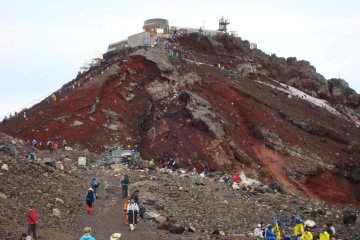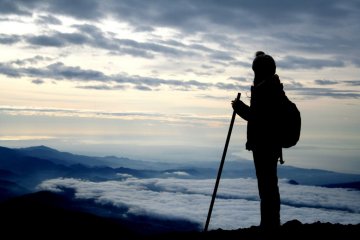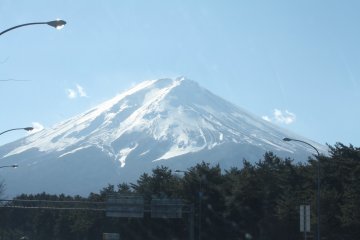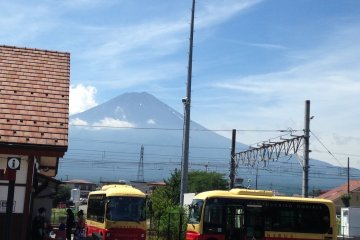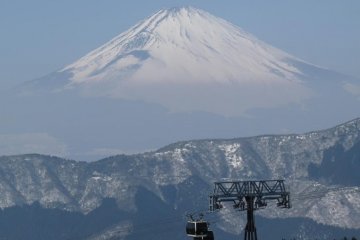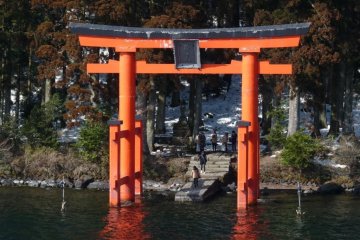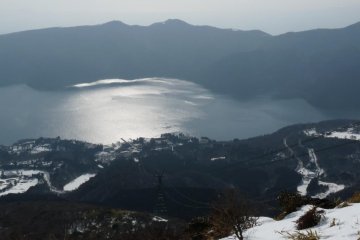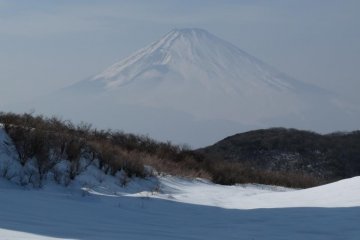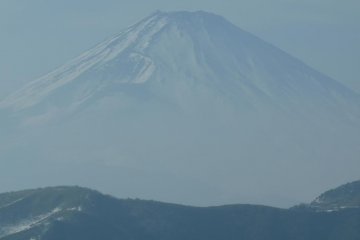I get a glimpse of Mount Fuji in the bright sunshine, rising above the other mountains, with its distinct concentric form and snowy top. It is awe-inspiring. I get off the bus with the crowds, but only a few of us head to the viewpoint to see the sacred mountain. By the time I’ve taken in the view and breathed in the sulphuric volcanic air, it seems the crowds have disappeared. I make my way to the Hakone Ropeway. The terminus shop sells local black eggs that are boiled in the sulphur springs. Local legend has it that if you eat one it will add eleven years to your life.
It turns out that the Hakone Ropeway is actually a cable car ride to Togendai, which offers stunning views of Mount Fuji and Lake Ashi. Nevertheless, the cable car ropeway does provide spectacular views and I’m lucky that there’s no fog or mist. Initially, the view is just of Fuji, which is good enough, but as we go further I look down onto Lake Ashi. Its dark blue waters are surrounded by the dark green trees that contrast with the white of Fuji and the light-blue of the sky.
At Togendai, with pure Japanese efficiency, the cable car arrives and we transfer to a replica pirate ship for a cruise along the lake. The cruise leaves immediately and I don’t see any alternative but to join it. There’s no sign or explanation as to why it’s a pirate ship either. From the ship, Fuji is hidden by another mountain, but the views of the lake and its surrounding mountains are fantastic.
The Japanese cedar trees that circle the lake are almost autumnal with their dark green and browny-red colours. Only those at the foot of the mountains have the grey of winter. The lake is a crater lake, four hundred and twenty-five metres above sea level, and therefore never goes below four degrees in temperature. As we get to the southern side of the lake we pass shrines on the edge of the lake with their red gateways sitting in the water. At Hakone-machi I look back across the lake and Mount Fuji rises once more above the lake, towering above the other snowy mountains.
In the village of Hakone-machi, there’s a reconstruction of the checkpoint established by the Tokugawa Shogunate in 1619 which marked the border between the Kyoto and Edo regions. The checkpoint was to ensure weapons could not be smuggled into Edo and so that family members could not be sneaked out as hostages. Walking around the checkpoint Mount Fuji looms in the distance and the view is quite spectacular across the lake. I mostly ignore the checkpoint exhibits and stare out across the lake at this world-famous mountain. I sit with a coffee in a small café and have some “WTF” time.
It’s so strange to see the mounds of snow everywhere in this warmth. I take the ferry the short distance across the lake to Hakone-en, where I take the cable car up Mount Komagatake. At the base of the mountain, where the ferry terminal and the cable car station meet, one woman is desperate for business, waving small wood items - yosegizaiku (wooden mosaics) and himitsu-baku (secret boxes) - at the tour group ahead. The tour group is a strange mix of Chinese and Koreans plus a few Westerners. I hear American and British accents for the first time in days. The cable car terminus at the top of Mount Komagatake is even more run down than its counterpart at the bottom. When I bought my ticket for the cable car, the lady held a sign up to me that confusingly said: ‘Toilet becomes the mountain of the foot only’. I realise now, at the top, this meant there are no toilets up here but, in point of fact, there’s nothing up here at all.
Outside, with the elevation of the mountain, it’s cold and windy. The ground is covered with deep snow and thick ice, but the view is incredible. Behind the cable car building, on the peak of the mountain, is a red temple with a red gateway. From my viewpoint, it seems like the temple is at the very top of the world.
The view to the south is the lake with the mountainside in the shade. The view to the north is the lake with Fuji rising above it. The bright haze of the day causes the white snow of Fuji’s peak to merge with the white clouds in the sky. It’s simply quite stunning.



